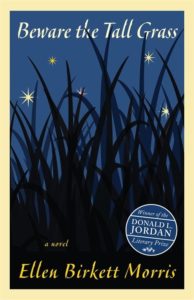 Review by Diane Gottlieb
Review by Diane Gottlieb
What would you do if your young son’s night terrors have begun to spill into his daytime hours? If your own childhood was fraught, leaving you with few positive parenting models to draw from? If your husband was not taking your son’s struggles seriously? These are just some of the challenges facing Eve, one of two protagonists in Ellen Birkett Morris’s deeply engaging novel Beware the Tall Grass, winner of the Donald L. Jordan Award for Literary Excellence. The other of the novel’s main characters is a sensitive young man named Thomas, whose story takes place decades before and revolves around a hasty decision that dramatically changes the trajectory of his life.
The novel’s chapters alternate between Eve’s and Thomas’s points of view. This juxtaposition of two seemingly unrelated voices and plot lines creates a built-in tension that keeps the reader turning pages. Thomas, a kind and thoughtful high school senior, suffers a terrible loss after having to shoot his injured, beloved horse Beau. Desperate to fill his emptiness and find a place to ground himself beyond the farmlands of Montana, he impulsively enlists in the army. Shortly after graduation, Thomas is sent to fight in Vietnam, leaving behind a loving girlfriend and parents. We follow his through his military training and onto the battlefield; we watch him grow up too quickly and bear witness to the horrors war inflicts upon young men.
In the meantime, Eve’s young son Charlie is becoming increasingly haunted by visions and memories of events he could not possibly have experienced. Charlie uses language and engages in play that confound—and terrify—Eve. One exchange between them, starts with Eve’s simple question:
“Who are you, today?”
“Fireman.”
“What are you putting out?”
“Tree. Napalm got it” (45-46).
Eve reflects on her son’s odd response: “Charlie’s choice of words disturbed me. He talked a lot, using words that far exceeded what you would expect from a four-year-old. But it was the violence of the words that freaked me out. Something was different here and I kept trying to figure out what it was” (46).
Morris’s skillful use of foreshadowing in the very first pages prepares us for Eve’s journey of discovery. Shortly after Charlie’s birth, Eve wonders about Charlie’s facial expression: “When he looked at me, it wasn’t with the soft focused stare I expected. His gaze had depth. He looked like he’d already seen things worth talking about” (2). Eve’s own upbringing, by a critical and emotionally absent mother, leaves her questioning how best to help Charlie. Eve’s husband Dan, whose mother lived her life according to her horoscope and who lost their family money to psychic hotlines, is in denial. Dan attributes Charlie’s disturbing visions and behaviors to what he views as normal childhood phases.
This difference in approach to Charlie’s pain creates great distance in an otherwise solid and loving marriage and leaves Eve feeling terribly alone. After one of Eve’s many attempts to get Dan to act, he waves her off:
“‘Leave it Eve. It’s late and you are tired and I am not up for this conversation,’ said Dan. We had never, ever not finished a conversation. If I was dismissed, I might as well go to bed … I woke up feeling groggy but more convinced than ever that I was the only one willing to advocate for Charlie” (142).
Advocate for Charlie, she does. Eve takes him to doctors—pediatricians, neurologists, psychiatrists—sometimes without consulting Dan. The last professional is a specialist in pediatric past-life regression.
Morris weaves in interesting subplots that support the narrative. We see Eve make peace with her own childhood, as her mother becomes gravely ill. Eve’s conviction to directly confront denial and advocate for those she loves is strengthened, as she helps a longtime friend caught in the throes of an abusive relationship.
While I won’t give away any outcomes regarding that friendship, Eve’s marriage, Charlie’s struggles, or even Thomas’s experience in Vietnam, I will say that Beware the Tall Grass moves at a wonderful pace and that all loose ends tie together by the novel’s conclusion. More intriguing than the outcomes, however, is the way Eve deals with gaslighting, feeling dismissed, having to advocate for her child in the face of opposing forces—issues mothers often find themselves contending with. Eve has much to teach us about perseverance, courage, and growth, and Beware the Tall Grass is a captivating exploration of relationships, life’s mysteries, and above all, the healing power of love.
Beware the Tall Grass by Ellen Birkett Morris
Columbia State University Press, 2024, $22.95 (paper)
ISBN: 9798988732105
Diane Gottlieb is the editor of Awakenings: Stories of Body & Consciousness (ELJ Editions 2023) and the Prose/CNF Editor of Emerge Literary Journal. Her work appears in River Teeth, Florida Review, Smokelong Quarterly, Huff Post, The Rumpus, among many other lovely places.
